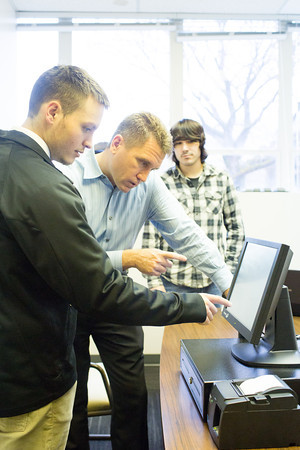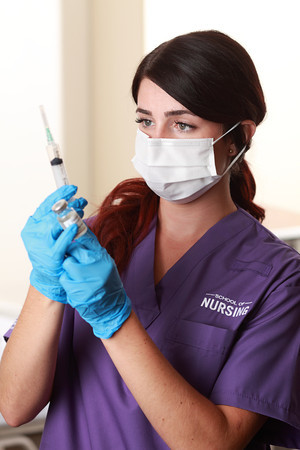WSU Announces Two New Master’s Degree Programs
OGDEN, Utah — The Utah State Board of Regents has approved two new master’s degree programs for Weber State University: a Master of Science in Computer Engineering and a Master of Science in Nursing-Nurse Practitioner.
With the additions, Weber State will offer 13 graduate programs, including accounting, athletic training, communication, criminal justice, education, English, health administration, business administration (MBA), nursing, radiologic sciences and taxation.
These programs help fulfill Weber State’s dual role as an open-enrollment university and an institution that provides graduate education opportunities.

Computer Engineering
The university now will offer a new Bachelor of Science in Computer Engineering and a Master of Science in Computer Engineering. Students can combine both degrees in a five-year accelerated program.
“WSU has had sustained success in its baccalaureate programs in computer science and electrical engineering,” said Brian Rague, WSU computer science chair. “Providing a master’s degree in computer engineering that draws on the faculty expertise, curriculum and research within both of these established programs emerged as an appropriate and exciting opportunity.”
The programs were developed after reviewing similar degrees offered by several universities across the nation. More than 25 students are expected to begin the program in the College of Engineering, Applied Science & Technology in fall semester with anticipated growth to more than 110 by 2020.
“The combined bachelor’s and master’s of science degree will meet a critical workforce need, especially in Northern Utah's aerospace sector,” said Mike Vaughan, former WSU Provost. “The degree will also be WSU's first graduate degree in engineering, and it will complement WSU's well-established bachelor's degree in electrical engineering.”
With the continued growth of digital technologies, more and more industries are expected to have demand for engineers. This sparked WSU’s initiative and ongoing commitment to meet the educational needs of both private industry and government, including Hill Air Force Base.
“This program is an excellent fit for WSU and the working students in the surrounding community, as well as the industries in Weber and Davis counties that benefit from the supply of graduates this program will provide,” Rague said.
Currently, WSU graduates about 140 students a year in its computer science programs, and those graduates have a 95 percent job-placement rate in the industry.
Nurse Practitioner
 The new Master of Science in Nursing-Nurse Practitioner (MSN-NP) will be the third track in WSU’s Master of Science in Nursing program. The other two tracks are for nurse executives and for nurse educators.
The new Master of Science in Nursing-Nurse Practitioner (MSN-NP) will be the third track in WSU’s Master of Science in Nursing program. The other two tracks are for nurse executives and for nurse educators.
"WSU is the largest provider of nurses in the state of Utah, and WSU's nursing program is one of the largest programs in the United States,” Vaughan said. “The nurse practitioner program will keep WSU on the cutting edge of nursing education and meet a critical healthcare need."
WSU’s new MSN-NP program will be offered in a hybrid format: partially online and partially in a clinical setting. This opens up the possibility for more students in rural areas of the state to complete courses.
“We will be on the forefront of advancing the field of nursing,” said Melissa Neville, MSN program director. “By adding this nurse practitioner program, the School of Nursing will add a higher-level clinical component that will support our present philosophy. We want to prepare nurses who can practice at all levels and meet the demands of changing health care.”
The program, housed in the Dr. Ezekiel R. Dumke College of Health Professions, is designed to prepare registered nurses to diagnose and manage acute and chronic health problems, prescribe medications, plan treatments and teach patients to promote and maintain health. Career opportunities for nurse practitioners are expected to increase across the country, particularly in rural areas.
“If you look at the cost of health care, a nurse practitioner is not quite as expensive as a physician, but can still give quality care,” said Susan Thornock, WSU nursing chair. “They will work directly with physicians and can help meet health-care needs now and in the future.”
The program will begin with 15 students per year, but will seek to expand once the first groups have been evaluated.
“We will serve the northern end of the state, as Weber State has always done,” Thornock said. “We have always extended into the rural areas of Utah. At this time, that is where I believe the need for a primary care giver is important.”
WSU graduates approximately 400 baccalaureate nursing students each year. The MSN-NP program will begin in fall 2016.
For more information on the College of Engineering, Applied Science & Technology, visit weber.edu/coast. For more information on the School of Nursing, visit weber.edu/nursing.
Visit weber.edu/wsutoday for more news about Weber State University.
- Marcus Jensen, Office of Marketing & Communications
801-626-7295 • marcusjensen@weber.edu - Contact:
- Brian Rague, computer science chair
801-626-7377 • brague@weber.edu
Susan Thornock, nursing chair
801-626-6833 • sthornock@weber.edu